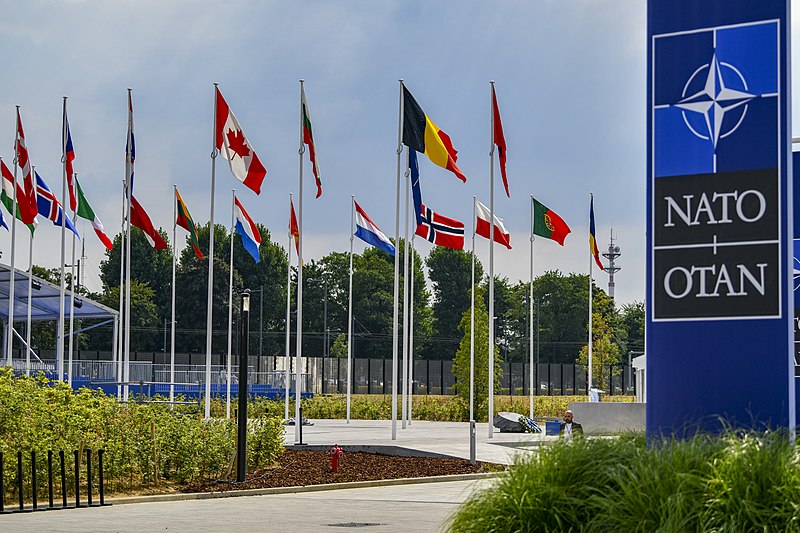The NATO alliance said it is prepared to intervene in the tensions between Kosovo and Serbia should the two nations continue to be at odds. The alliance said it is ready to step up its peacekeeping forces in Kosovo should tensions potentially escalate.
Speaking at a press conference with Serbian President Aleksandar Vucic Wednesday, NATO Secretary-General Jens Stoltenberg said the alliance is prepared to step up its peacekeeping forces, noting that there are nearly 4,000 peacekeeping troops in Kosovo.
Stoltenberg’s comments came ahead of the discussions between Serbia and Kosovo.
“If needed, we will move forces, deploy them where needed, and increase our presence. We have already increased the presence in the north. We are ready to do more,” said Stoltenberg.
Tensions between Serbia and Kosovo escalated this month when Pristina said it would favor Serbs that reside in the north, backed by Belgrade and do not recognize Kosovo institutions, to use license plates issued in Pristina.
The situation eased when Kosovo Prime Minister Albin Kurti, facing pressure from the United States and the European Union, agreed to postpone the move to September 1.
However, Vucic said during the news conference at NATO that the upcoming discussions with Kurti Thursday would pose a challenge as both sides disagree on nearly everything. Kurti, who met with Stoltenberg prior to the NATO chief’s meeting with Vucic, reiterated Kosovo’s desire to become a NATO member state.
“The threats, risks, and challenges that NATO faces in the current security environment are felt by our country as well,” Kurti told reporters, linking the issues to Russia’s influence in the region.
During the talks between Vucic and Kurti, both sides failed to reach an agreement to resolve differences that have fueled tensions between the two nations. However, both sides agreed to resume talks ahead of the September 1 deadline, which may fuel further unrest.
“Unhappily, we did not yet come to an agreement today,” the EU’s foreign policy chief Josep Borrell told reporters Thursday after the hours-long discussions, yet suggested optimism as both sides agreed to meet again for another round of discussions. Borrell added that there is still time before the deadline.



 Trump Says “Very Good Talks” Underway on Russia-Ukraine War as Peace Efforts Continue
Trump Says “Very Good Talks” Underway on Russia-Ukraine War as Peace Efforts Continue  Trump Endorses Japan’s Sanae Takaichi Ahead of Crucial Election Amid Market and China Tensions
Trump Endorses Japan’s Sanae Takaichi Ahead of Crucial Election Amid Market and China Tensions  Trump Signs “America First Arms Transfer Strategy” to Prioritize U.S. Weapons Sales
Trump Signs “America First Arms Transfer Strategy” to Prioritize U.S. Weapons Sales  U.S. to Begin Paying UN Dues as Financial Crisis Spurs Push for Reforms
U.S. to Begin Paying UN Dues as Financial Crisis Spurs Push for Reforms  U.S.-India Trade Framework Signals Major Shift in Tariffs, Energy, and Supply Chains
U.S.-India Trade Framework Signals Major Shift in Tariffs, Energy, and Supply Chains  Iran–U.S. Nuclear Talks in Oman Face Major Hurdles Amid Rising Regional Tensions
Iran–U.S. Nuclear Talks in Oman Face Major Hurdles Amid Rising Regional Tensions  Trump Allows Commercial Fishing in Protected New England Waters
Trump Allows Commercial Fishing in Protected New England Waters  Japan Election 2026: Sanae Takaichi Poised for Landslide Win Despite Record Snowfall
Japan Election 2026: Sanae Takaichi Poised for Landslide Win Despite Record Snowfall  Norway Opens Corruption Probe Into Former PM and Nobel Committee Chair Thorbjoern Jagland Over Epstein Links
Norway Opens Corruption Probe Into Former PM and Nobel Committee Chair Thorbjoern Jagland Over Epstein Links  China Warns US Arms Sales to Taiwan Could Disrupt Trump’s Planned Visit
China Warns US Arms Sales to Taiwan Could Disrupt Trump’s Planned Visit  New York Legalizes Medical Aid in Dying for Terminally Ill Patients
New York Legalizes Medical Aid in Dying for Terminally Ill Patients  Trump Allegedly Sought Airport, Penn Station Renaming in Exchange for Hudson River Tunnel Funding
Trump Allegedly Sought Airport, Penn Station Renaming in Exchange for Hudson River Tunnel Funding  Pentagon Ends Military Education Programs With Harvard University
Pentagon Ends Military Education Programs With Harvard University  India–U.S. Interim Trade Pact Cuts Auto Tariffs but Leaves Tesla Out
India–U.S. Interim Trade Pact Cuts Auto Tariffs but Leaves Tesla Out  Netanyahu to Meet Trump in Washington as Iran Nuclear Talks Intensify
Netanyahu to Meet Trump in Washington as Iran Nuclear Talks Intensify  Trump Signs Executive Order Threatening 25% Tariffs on Countries Trading With Iran
Trump Signs Executive Order Threatening 25% Tariffs on Countries Trading With Iran  Ohio Man Indicted for Alleged Threat Against Vice President JD Vance, Faces Additional Federal Charges
Ohio Man Indicted for Alleged Threat Against Vice President JD Vance, Faces Additional Federal Charges 































